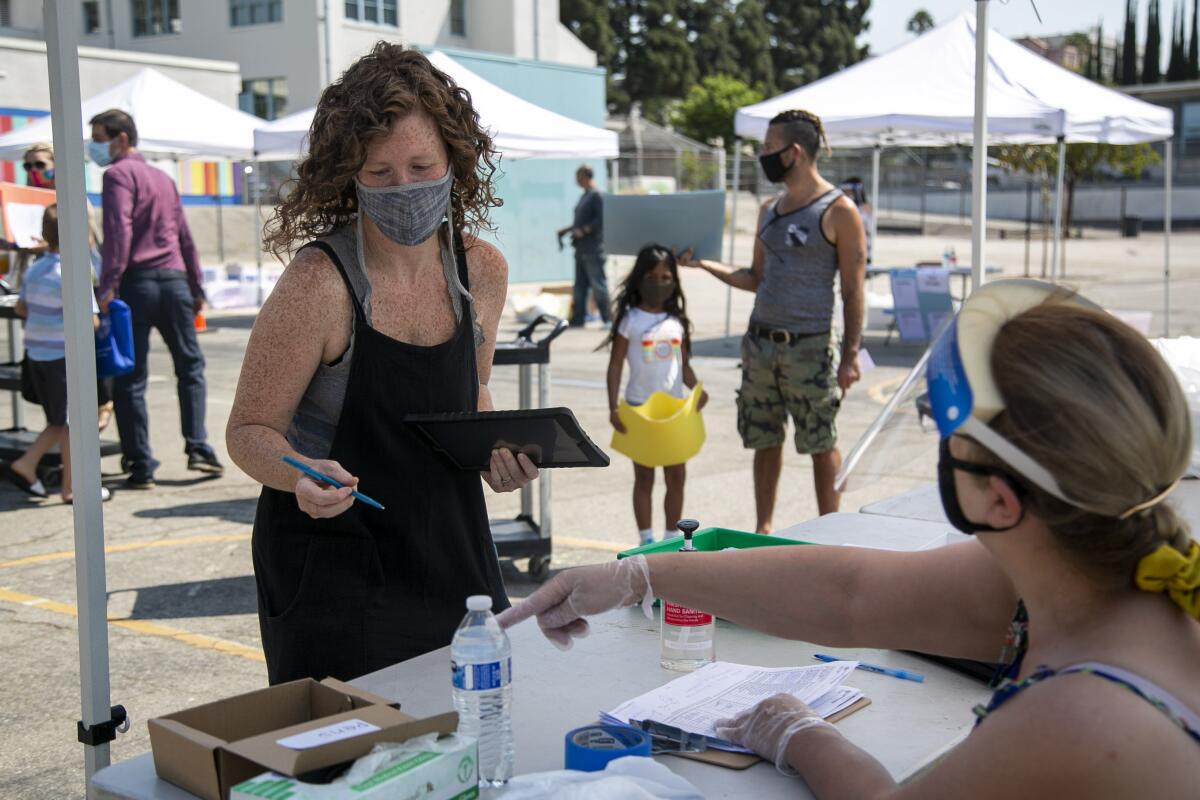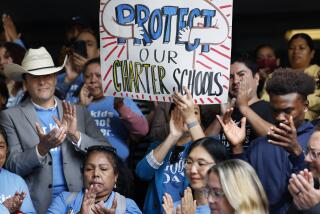L.A. school officials have 3 weeks to devise emergency child-care plan, board orders

- Share via
Alarmed by the city’s child-care crisis, the Los Angeles Board of Education on Tuesday called for an emergency plan to help parents navigate the challenge of working while supervising their children who are learning from home because of the coronavirus pandemic.
The board called on L.A. schools Supt. Austin Beutner to deliver a plan by Sept. 15.
In a separate action, the board voted to make ethnic studies a graduation requirement and also to incorporate ethnic studies into the work at all grade levels — a repeat of a 2014 effort that was not fully implemented.
For parents already struggling with child-care problems, help would be arriving later than needed, as the school year started Aug. 18.
The availability of child care has become severely strained since campuses closed in mid-March. Since then, financial losses, concerns about exposure to the virus and navigating a maze of new safety guidelines have forced some 9,300 licensed child-care providers — almost 1 of every 4 in the state — to close, according to data from the California Department of Social Services that show closures through July 31.
In bringing forward the motion, board member Nick Melvoin wants to expand the child care that L.A. Unified has begun to provide for school staff working from schools.
He called on the district to explore offering as much child care as feasible to families of students, based on a priority ranking. This ranking should take factors into account such as whether the parents are essential workers, whether the students are in foster care or their families are homeless, and whether students have special needs, including those with disabilities who face particular struggles with distance learning.
Melvoin also envisions the child care including academic support.
Katie Pace, a parent leader at Gardner Street Elementary in Hollywood, said in an interview that the need is acute. One single mother, she said, has to leave her first-grader home alone to avoid losing her job, relying on a neighbor to check on the child from time to time.
Such situations make academic inequities worse for families with few resources, said Elisha Smith Arrillaga, executive director of the Oakland-based research and advocacy group Ed Trust—West.
“Young children need adults to help navigate logging in and out of Zoom, Google classroom, and other platforms used by schools and districts,” Smith Arrillaga said.
Supt. Beutner said the district is fully aware of the problem and has been trying to develop solutions.
“This is the work we do every day,” Beutner said, and the board’s resolution would not change that. He warned against unrealistic expectations.
“We’re still under a severe burden from COVID in the community,” Beutner said. “We can’t leave the science behind... One of my concerns is we bring students and staff back to school in a safe matter so it can sustain itself.”
County officials on Tuesday said a drop in coronavirus infections — if sustained for two more weeks — would allow health officials to approve waivers for the reopening of elementary schools, a step beyond child care. L.A. school district officials had no immediate comment on that development.
In its unanimous vote on ethnic studies, the board side-stepped a contentious debate at the state level over what should be included in California’s official “model curriculum.” But the resolution, brought forward by Kelly Gonez, added language contending that ethnic studies is needed to counteract “current curricula” with persisting “Racism, Eurocentrism, white supremacy, anti-Blackness, and anti-Indigeneity.”
In an email, Gonez said she was not suggesting that current California textbooks promote white supremacy, although “there are certainly examples of curricula and textbooks that perpetuate white supremacy in the U.S.”
“Generally speaking, it is problematic that our curricula continue to center on white perspectives and white voices, which marginalizes the experiences and assets of communities of color,” Gonez said.
The resolution will make ethnic studies a graduation requirement starting with the Class of 2024.
The goal has a familiar ring. In 2014, the school board passed a motion mandating an ethnic studies requirement starting with the Class of 2019. Other issues and higher budget priorities took precedence instead.
As of the 2019-20 school year, about 100 L.A. Unified high schools were offering University of California-approved ethnic studies courses, but only 12,000 students had completed them over the last five years.
More to Read
Sign up for Essential California
The most important California stories and recommendations in your inbox every morning.
You may occasionally receive promotional content from the Los Angeles Times.














